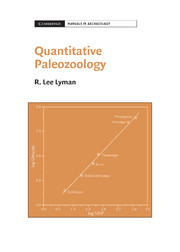Book contents
- Frontmatter
- Contents
- List of figures
- List of tables
- Preface
- 1 Tallying and Counting: Fundamentals
- 2 Estimating Taxonomic Abundances: NISP and MNI
- 3 Estimating Taxonomic Abundances: Other Methods
- 4 Sampling, Recovery, and Sample Size
- 5 Measuring the Taxonomic Structure and Composition (“Diversity”) of Faunas
- 6 Skeletal Completeness, Frequencies of Skeletal Parts, and Fragmentation
- 7 Tallying for Taphonomy: Weathering, Burning, Corrosion, and Butchering
- 8 Final Thoughts
- Glossary
- References
- Index
5 - Measuring the Taxonomic Structure and Composition (“Diversity”) of Faunas
Published online by Cambridge University Press: 05 June 2012
- Frontmatter
- Contents
- List of figures
- List of tables
- Preface
- 1 Tallying and Counting: Fundamentals
- 2 Estimating Taxonomic Abundances: NISP and MNI
- 3 Estimating Taxonomic Abundances: Other Methods
- 4 Sampling, Recovery, and Sample Size
- 5 Measuring the Taxonomic Structure and Composition (“Diversity”) of Faunas
- 6 Skeletal Completeness, Frequencies of Skeletal Parts, and Fragmentation
- 7 Tallying for Taphonomy: Weathering, Burning, Corrosion, and Butchering
- 8 Final Thoughts
- Glossary
- References
- Index
Summary
One of the most common analytical procedures in paleozoology is to compare faunas from different time periods, from different geographic locales, or both (e.g., Barnosky et al. 2005 and references therein). Comparisons may be geared toward answering any number of questions. Does the taxonomic composition of the compared faunas differ (and why), and if so, by how much (and why)? Does the number of taxa represented (NTAXA) differ between faunas (and why), and if so, by how much (and why)? Do the abundances of taxa vary (and why)? Ignoring the “and why's,” these and similar queries are what can be considered proximal questions. The why questions are the ultimate questions of interest; they constitute a reason(s) to identify and quantify the faunal remains in the first place. Was hominid or human dietary change over time the cause of the change in taxonomic composition, abundance, and so on? Did the environment (particularly the climate) change such that different ecologies prompted a change in the taxa present, the number of taxa present, or the abundances of various taxa? It is beyond the scope of this volume to consider these ultimate why questions other than as examples. The purpose of this chapter is to explore how quantitative faunal data can be analytically manipulated in order to produce answers to these kinds of proximal questions.
Information
- Type
- Chapter
- Information
- Quantitative Paleozoology , pp. 172 - 213Publisher: Cambridge University PressPrint publication year: 2008
